Spaying or neutering a cat is a common practice that veterinarians highly recommend. Experts point to many benefits of having your kitten or adult cat spayed or neutered, reducing roaming behaviors in males, and eliminating a female cat’s tendency to urinate in the house during heat cycles. It also minimizes the number of animals in shelters.
Kittens are often spayed or neutered before rescues and animal shelters allow them to go to their forever homes. The rescue or shelter typically covers the cost, giving prospective pet parents one less expense to cover. However, this is not always the case, particularly if you are caring for a very young kitten. If your new furry friend hasn’t been fixed, you may be wondering when to neuter him (or, in the case of a female feline, spay). Is it possible to have the surgery done too soon or late? Here’s what the experts have to say.
When to spay or neuter a kitten
Generally, kittens are spayed or neutered when they are 5 to 6 months old, around the time they reach sexual maturity. However, sometimes they will undergo the procedure between six and eight weeks. Older kittens and even adult cats can also be spayed or neutered.
What happens if you neuter a cat too early?
There is a ton of information out there about early spaying and neutering. It can cause some confusion among pet parents, who understandably just want to do right by their kitty.
Since cats hit sexual maturity at five months, some advocates have pushed for the standard age for neutering a kitten to go down from five to six months to four to five months. The ASPCA supports spaying or neutering pets when they reach two months and are over 2 pounds. The American Veterinary Medical Association (AVMA) also promotes early-age spay and neuter.
There have been concerns raised about early spaying or neutering, including stunting growth and increased shyness. The research doesn’t support these claims.
That said, it is possible to neuter a kitten too early, and doing so can complicate the surgery. Vets will generally wait until the kitten reaches about 2 to 3 pounds before spaying or neutering. If a vet performs the procedure before this time, it can be more of a challenge for the vet to manipulate the tissues.

How late is too late to spay or neuter a cat or kitten?
Advocates for early spaying and neutering point to benefits, such as the decreased risk for mammary tumors in female cats and decreased overpopulation. However, it’s important to know experts also say adult cats can safely undergo spay or neuter procedures, too. If your cat is seven years of age or older, the vet will order pre-surgical bloodwork to ensure their kidneys and liver are strong enough to undergo anesthesia. As long as the bloodwork checks out, it’s perfectly safe to send your pet in for the surgery.
Do kittens change after being neutered?
Pet parents may be concerned that after spaying or neutering, their kitten’s behavior will change, losing playful, outgoing qualities they’ve come to know and love. Vets haven’t noticed these types of changes. That said, the procedure can reduce less wanted behaviors, including:
- Aggression
- Irritability
- Frequent urination
- Marking
- Roaming
- Mounting
It’s important to note that experts say it’s not a cure-all for behavioral issues, and it may take longer to notice changes in an older cat.
Final thoughts on neutering and spaying
There are many reasons why pet parents should seriously consider spaying or neutering their kittens, including preventing unnecessary euthanization of healthy pets by reducing the number of animals in shelters. When to spay or neuter a kitten is also an important conversation to have, particularly with a vet. Again, kittens are traditionally spayed or neutered at five to six months, but it’s not uncommon for them to undergo the procedure earlier. The ASPCA promotes spaying and neutering animals who are two months old and weigh at least 2 pounds. It is never too late to spay or neuter a cat, though senior pets will undergo bloodwork before surgery to ensure they’re healthy enough. There is no evidence to support the idea that early-age spaying or neutering increases shyness in an animal. Unwanted behaviors, reducing a male cat’s tendency to roam, may stop. You may not notice any changes in your cat.
Editors' Recommendations
- What you need to know about crating a cat at night
- What you need to know about your cat’s swollen lip – what caused it and how to help it heal
- Can cats have autism? Here’s what to know about unusual behavior in cats
- Why do cats stick out their tongues? Here are several surprising (and mostly harmless) reasons
- Everything you need to know about the munchkin cat: Some facts may surprise you




